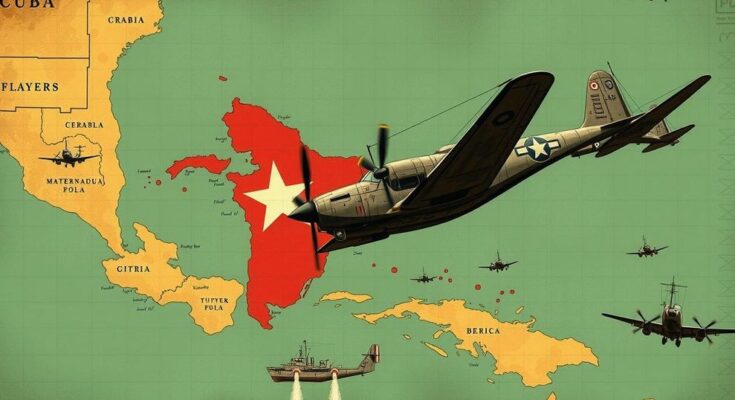This article reviews Cuban geopolitics during the Cold War, focusing on Fidel Castro’s discourse regarding security, socialism, and the complex dynamics within socialist and non-aligned movements. It highlights Cuba’s strategic diplomatic engagements, critiques of Soviet and Chinese policies, and the importance of sovereignty in Marxist-Leninist principles. The lessons learned underscore the relevance of Cuba’s geopolitical maneuvers in contemporary international relations and power dynamics.
In June 1972, Fidel Castro articulated the stark distinctions between the geopolitical contexts of Europe and the Caribbean to Polish Communist leaders. He emphasized that while Europe viewed security as a fundamental aspect of peace, the Cuban populace lived without a notion of security, relying solely on self-protection. Castro’s reflections highlighted that geographical and historical factors influenced how different regions interpreted Marxism-Leninism in their struggles against imperialism.
Castro’s discourse reinforced that neither Cuba nor Vietnam held a position as sacred territories of the socialist bloc, as their struggles resonated more with Third World concerns rather than those of Eastern Europe. Despite being economically tied to the socialist camp and participating in the Council for Mutual Economic Assistance, Cuban diplomacy remained grounded in its unique circumstances, maintaining an understanding of its geopolitical realities.
The Cuban government had previously recognized the legitimacy of the Soviet-led intervention in Czechoslovakia in 1968 but criticized its lack of legal standing under international law. Castro’s stance differentiated between legality and geopolitical necessity, illustrating that ideological consistency was compromised if it did not align with Cuba’s interests. Moreover, he noted that, if true socialist support existed, intervention efforts would also extend to Vietnam.
Critics have often alleged that Cuba conformed to Soviet directives; however, Castro’s Eastern European tour in 1972 conveyed a more complex diplomatic narrative. By forging political alliances across various ideologies within the Tricontinental and Non-Aligned Movements, Cuba aimed to combat U.S. isolation and strengthen itself against a detrimental geopolitical environment.
Cuba’s alliances were not merely aimed at exporting revolution but building consensus based on shared interests, despite being perceived by some as inciting terrorism. The clientelist policies employed by the USSR and China fueled internal disagreements rather than imperialist threats. In 1979, Cuba, as a leader within the Non-Aligned Movement, criticized China for its imperialistic activities, highlighting the geopolitical rifts arising from such alliances.
The Soviet Union’s invasion of Afghanistan required Cuba to navigate a complex diplomatic landscape, emphasizing the need to uphold sovereignty while addressing criticism of Soviet actions from within the Non-Aligned Movement. This tension demonstrated Cuba’s strategic attempts to balance its long-standing alliance with the Soviet bloc while advocating for international norms.
Cuba’s policies and alliances towards Africa in the Cold War era illustrated its strategic maneuvering capabilities. Engaging with liberation movements and collaborating on military operations, Cuba leveraged opportunities to enhance its political and military standing on the continent. These geopolitical engagements were pivotal, particularly in cases like Angola and Somalia, where the geopolitical dynamics shifted.
As Gorbachev’s perestroika unfolded, it diverged from Cuban political interests, reflecting a broader set of geopolitical considerations over domestic policies. Fidel Castro acknowledged Gorbachev as a proponent of progressive ideals while simultaneously emphasizing the importance of sovereignty among socialist countries. Castro’s statements resonated as he reaffirmed that sovereignty encapsulates a core tenet of Marxism-Leninism, thereby respecting each nation’s rights to determine their paths.
The geopolitical lessons from Cuba’s past amidst the Cold War are relevant in today’s intricate political landscape. They lead to a deeper comprehension of how new geopolitical configurations may reflect upon global power influences. Understanding such historical contexts can guide current international politics while recognizing the potential resurgence of Cold War dynamics on global and regional scales. Objectively analyzing past strategies may instill resilience and coherence in formulating future policies for navigating evolving geopolitical territories.
In conclusion, Cuba’s Cold War geopolitics reflect a nuanced interplay of diplomatic strategies that navigated the complexities of socialist alliances and Third World aspirations. Fidel Castro’s emphasis on sovereignty and self-determination serves as pivotal lessons for contemporary geopolitics. The legacy of Cuba’s diplomatic engagements, particularly in the context of regional influences and ideological divisions, underscores the necessity for informed policymaking in an increasingly multipolar world. Understanding Cuba’s strategic positioning during the Cold War offers key insights for addressing enduring geopolitical challenges today.
Original Source: oncubanews.com




